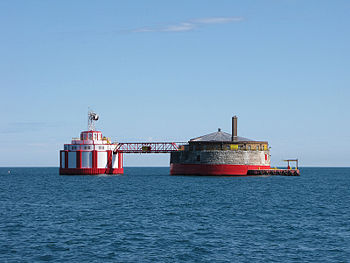William E. Dever Crib Light
From lighthouses
Chicago, Illinois
Built: 1935
Water cribs are offshore structures that collect water from close to the bottom of a lake to supply a pumping station onshore. Today, 4 cribs provide water to Chicago and its suburbs. The tunnels leading from the cribs are close to 200 feet beneath the lake and vary in shape from cylindrical to ovular and in diameter from 10 to 20 feet. Lake water enters the cribs and flows through these tunnels to pumps at water purification plants. Until the 1990s, "Crib Tenders", much like lighthouse keepers, lived on the cribs. After 9/11, the Chicago cribs were designated a "security zone" and complete security systems were installed, including video, motion detectors, microwave link, and door sensors, all with direct links to Chicago Police monitoring stations. Any craft that enters the buoyed security zone is subject to boarding, ticketing and impounding.
The William E. Dever Crib is actually part of two interconnected buildings. The older structure, built in 1900, is the Carter Harrison Crib, while the newer (birthday cake) one is the Dever Crib. Both cribs are named for former Chicago Mayors. Intended to replace the Harrison Crib, both remained operational until 1997 because of increased demand for water. The active navigation light on the crib is a square cylindrical skeletal tower centered atop the structure. It has a focal plane of 72 feet and a quick flashing white light.
Navigational Options
- Return to Fifty-third Lighthouse Expedition
- Go to Alphabetical Listing
- Go to Geographical Listing
- Return to Lighthouse Home Page
Lighthouses: A Photographic Journey
- Conceived and Developed by David S. Carter
- Photographs by Donald W. Carter
- Text by Diana K. Carter, Donald W. Carter & David S. Carter
Copyright © 1995-2011 David S. Carter, Donald W. Carter, & Diana K. Carter. All rights reserved. Reproduction by any means, physical or electronic, in part or in full, without the express permission of the authors, is strictly prohibited.
This article was last modified on 9/18/2010.

